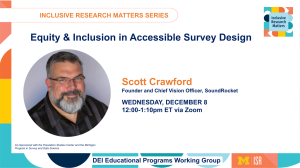Presented By: Institute for Social Research
Equity & Inclusion in Accessible Survey Design
Inclusive Research Matters Series

Equity & Inclusion in Accessible Survey Design
Wednesday, December 8, noon to 1:10pm ET via Zoom (link to come)
Speaker: Scott Crawford (Founder and Chief Vision Officer, SoundRocket)
As we work to adapt research designs to make use of new technologies (web and smart devices), it is also important to consider how study design and survey design may impact those who rely on assistive technology. Sections 508 (covering use of accessible information and communication technology) and 501(addressing reasonable accommodation) of the Rehabilitation Act of 1973 compliance standards have been around for a long time—but the survey research industry has often taken the path providing reasonable (non-technological) accommodations for study participants. These often involve alternate modes of data collection, but rarely provide a truly equitable solution for study participation. If a web-based survey is not compliant with assistive technologies, the participant may be offered the option of completing a survey with an interviewer. Survey methodologists know well that introducing a live human interaction may change how participants respond—especially if the study involves sensitive topics. Imagine a workplace survey on Diversity, Equity, and Inclusion where a sight-impaired employee is asked to answer questions about how they are treated in their workplace, but they are required to answer these questions through an interviewer, and not privately via a website. Not only is this request not equitable for the employee (fully sighted employees get to respond more privately), it can also bias the results if the participant is not honest about the struggle for fear of receiving backlash from their employer if the interviewer passed along their frustrations. In the act of being denied equitable participation, future decisions will then be made on potentially faulty results about the experience of such people.
In this presentation, I will focus on developing an equitable research design, partially through considering the overall study—not just the technology itself. But we will also share experiences in the development of a highly accessible web-based survey that is compliant with screen reading technology (screen readers, mouse input grids, voice, keyboard navigation, etc.). I will present experimental, anecdotal, and descriptive experiences with accessible web-based surveys and research designs in higher education student, faculty, and staff surveys conducted on the topic of Diversity, Equity, and Inclusion. Our results will be directly relevant for inclusion and equity in these settings as well as some surprising unintended positive consequences of some of these design decisions. Lastly, I will also share some next steps for where the field may go in continuing to improve in these areas.
Wednesday, December 8, noon to 1:10pm ET via Zoom (link to come)
Speaker: Scott Crawford (Founder and Chief Vision Officer, SoundRocket)
As we work to adapt research designs to make use of new technologies (web and smart devices), it is also important to consider how study design and survey design may impact those who rely on assistive technology. Sections 508 (covering use of accessible information and communication technology) and 501(addressing reasonable accommodation) of the Rehabilitation Act of 1973 compliance standards have been around for a long time—but the survey research industry has often taken the path providing reasonable (non-technological) accommodations for study participants. These often involve alternate modes of data collection, but rarely provide a truly equitable solution for study participation. If a web-based survey is not compliant with assistive technologies, the participant may be offered the option of completing a survey with an interviewer. Survey methodologists know well that introducing a live human interaction may change how participants respond—especially if the study involves sensitive topics. Imagine a workplace survey on Diversity, Equity, and Inclusion where a sight-impaired employee is asked to answer questions about how they are treated in their workplace, but they are required to answer these questions through an interviewer, and not privately via a website. Not only is this request not equitable for the employee (fully sighted employees get to respond more privately), it can also bias the results if the participant is not honest about the struggle for fear of receiving backlash from their employer if the interviewer passed along their frustrations. In the act of being denied equitable participation, future decisions will then be made on potentially faulty results about the experience of such people.
In this presentation, I will focus on developing an equitable research design, partially through considering the overall study—not just the technology itself. But we will also share experiences in the development of a highly accessible web-based survey that is compliant with screen reading technology (screen readers, mouse input grids, voice, keyboard navigation, etc.). I will present experimental, anecdotal, and descriptive experiences with accessible web-based surveys and research designs in higher education student, faculty, and staff surveys conducted on the topic of Diversity, Equity, and Inclusion. Our results will be directly relevant for inclusion and equity in these settings as well as some surprising unintended positive consequences of some of these design decisions. Lastly, I will also share some next steps for where the field may go in continuing to improve in these areas.